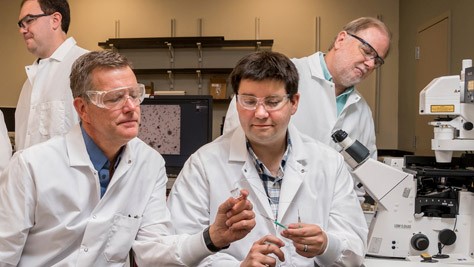A nano-lab for observing viruses and cells
Gleghorn Lab is part of a team that has been awarded $6 million grant from the National Science Foundation to probe how viruses interact with microbes. They will be developing new microfluidics technology to examine how a single virus and a single microbial cell interact.
“Over the past several decades, scientists and engineers have made massive strides in decoding, amassing and storing genomic data,” said Denise Barnes, NSF EPSCoR head. “But understanding how genomics influence phenotype remains one of the more profound challenges in science. These awards lay the groundwork for closing some of the biggest gaps in biological knowledge and developing interdisciplinary teams needed to address the challenges.”
“A big aim of our project is to democratize the microfluidics technology we develop so that the average lab can run these experiments,” Jason Gleghorn, assistant professor of biomedical engineering at UD, says. “It’s about making new tools and resources available to the broader scientific community.”
The University of Delaware’s deep involvement in two EPSCoR grants underscores the world-class leadership and bold ideas of our faculty, as well as the powerful role of interdisciplinary collaboration for society’s behalf,” said Charlie Riordan, vice president of research, scholarship and innovation.

